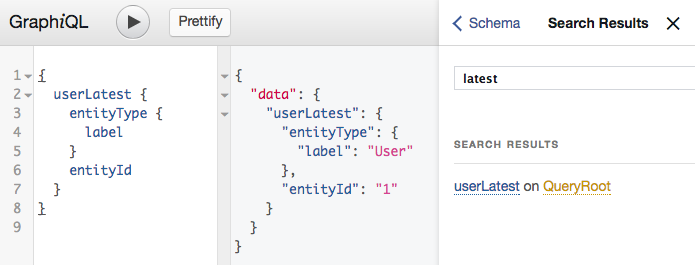Exposing new queries
Adding new queries to the schema is the simplest way to extend the GraphQL, as
it only uses existing types and only defines new queries and the fields they
expose. We shall create a new module for this, called graphql_example_query,
which defines a way to obtain the latest user created on the site (from
Drupal\user\Entity\User->uid):
- create the module directory and
graphql_example_query.info.yml, adding a dependency ongraphql. - since queries add fields to the schema, add a new field class to the module
- add a schema provider to the module, referencing the new field

To avoid typing, you can find the complete module in the examples/step1_query/
directory.
Adding a field class
- Field are simple classes (not services), extending the
Drupal\graphql\GraphQL\Field\FieldBasebase field class. - They are instantiated from a configuration including:
- a
nameto identify them - a
typeto describe their GraphQL type, - arguments, which GraphQL calls
args, known by their own name and type.
- a
- They should be organized in namespaces, with fields available on the root
query being in a
\Drupal\[module]\GraphQL\Field\Rootnamespace - as in the simple example below - or one of its sub-namespaces if the module defines multiple types of schema extensions.
// in src/GraphQL/Field/Root/LatestUserField.php
// ...
use Youshido\GraphQL\Type\TypeInterface;
use Youshido\GraphQL\Execution\ResolveInfo;
// ...
public function __construct(TypeInterface $type) {
$config = [
// The name by which users of GraphQL will know the field
'name' => 'userLatest',
// The field type definition used by GraphQL to describe it.
'type' => $type,
// An array of arguments for the field.
'args' => [],
];
parent::__construct($config);
}
- When invoked in a query, the field instance will need to
resolvethe actual values it needs to return, based on:- a current
value - the values of any
argsdeclared as available for the query - a
ResolveInfoobject containing- the field instance itself
- the parsed part of the query relating to the field, as an AST list
- an execution context, containing - among other things - the whole schema and the request itself
- a current
// ... see "use" clause in previous fragment.
public function resolve($value, array $args = [], ResolveInfo $info) {
$entityTypeManager = $this->container->get('entity_type.manager');
$entityStorage = $entityTypeManager->getStorage('user');
$query = $this->container->get('entity.query');
$uids = $query->getAggregate('user')
->aggregate('uid', 'MAX')
->execute();
$uid = reset($uids);
return $entityStorage->load($uid['uid_max']);
}
Adding a schema provider class
Once the field is defined, it can be exposed as part of the schema by a
SchemaProvider. These are collected services bearing the
graphql_schema_provider tag, like:
# in graphql_example_query.services.yml
services:
graphql_example_query.schema_provider:
class: 'Drupal\graphql_example_query\SchemaProvider\LatestUserSchemaProvider'
arguments:
- '@typed_data_manager'
- '@graphql.type_resolver'
tags:
- name: 'graphql_schema_provider'
Schema providers are likely to need at least the Typed Data Manager and the GraphQL Type Resolver services as arguments, to provide type information to the fields they expose.
They will normally extend Drupal\graphql\SchemaProvider\SchemaProviderBase in
order to take advantage of default definitions for the
SchemaProviderInterface methods. Since this example defines a new query, the
method to implement is getQuerySchema(), which returns an instance of the new
Field objects introduced by the provider:
// in src/SchemaProvider/LatestUserSchemaProvider.php
// ...
use Drupal\graphql_example_query\GraphQL\Field\Root\LatestUserField;
// ...
public function getQuerySchema() {
$dataDefinition = $this->typedDataManager->createDataDefinition('entity:user');
$outputType = $this->typeResolver->resolveRecursive($dataDefinition);
$fields = [
new LatestUserField($outputType),
];
return $fields;
}